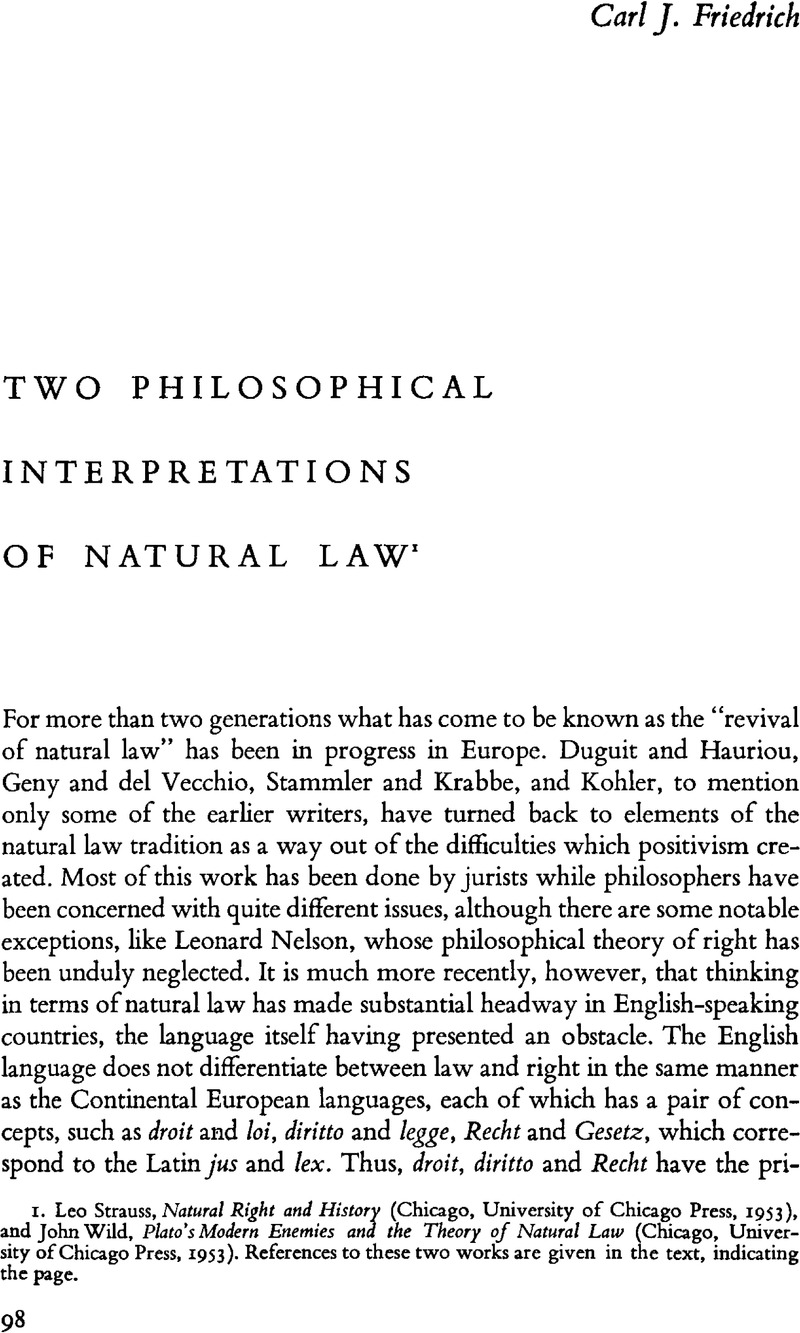No CrossRef data available.
Published online by Cambridge University Press: 01 July 2024

Leo Strauss, Natural Right and History (Chicago, University of Chicago Press, 1953), and John Wild, Plato's Modern Enemies and the Theory of Natural Law (Chicago, Univer sity of Chicago Press, 1953). References to these two works are given in the text, indicating the page.
2. Thus I found it desirable in rendering Hegel's Philosophie des Rechts into English to speak of it as a "Philosophy of Right and Law." Cf. my The Philosophy of Hegel (1953) for further clarification of this difficult issue.
3. This proposition would be clearer if the term "law" rather than "right" were used. For "right," in the common English connotation, does not "essentially belong to the city" whereas law might.
4. This excursion culminates in the proposition that "the good life, according to nature, is the retired life of the philosopher who lives at the fringes of civil society. The life devoted to civil society and to the service of others is not the life according to nature" (p. 113).
5. Strauss' rejection of the view of the Carliles and of Sabine (not cited!) that Cicero is an egalitarian and hence closer to Kant than to Plato and Aristotle is decidedly sound and sup ported by the numerous references he offers.
6. There are some shrewd remarks interlarded here about the "extreme situation," pp. 160 ff., which offer Strauss an opportunity to draw a distinction between Aristotle and Machiavelli, who denies natural right because inter alia "he seems to derive no small enjoy ment from contemplating these deviations" from the right. But these observations are scarcely adequate, considering Strauss' major concern with historicism which harks back to Machiavelli and Thucydides who are concerned with another kind of "law of nature."
7. See for all this my Inevitable Peace (1949), Ch. IV, where this problem is more fully dis cussed. Generally speaking, the history of natural law is more complex than Wild seems to recognize; there is no indication that he is familiar with the literature in the field, e.g., A. P. d'Entreves' admirable Natural Law—see below.
8. The Political Philosophy of Thomas Hobbes—Its Basis and Its Genesis (Oxford, Clarendon, 1936).
9. For the importance of this concept of power in interpreting the age of the Baroque, see my The Age of the Baroque—1610—1660 (1952). Here also the elucidation of the power-impotence paradox.
10. Strauss offers an amusing excursus on "caution" as "noble fear." Quoting Locke's Reasonableness of Christianity in a number of passages, he is able to show that Locke thought even Jesus to have practiced such "caution" as "to keep himself out of the reach of any accusa tion." Cautious speech is legitimate, in Locke's view, "if unqualified frankness would hinder a noble work … or expose one to persecution or endanger the public peace," he writes (p. 209).
11. Strauss himself, in an admirable passage, stresses that "every society regards a specific human type as authoritative" (p. 137), and he further recognized that this type may be the common man. "In order to be truly authoritative, the human beings who embody the admired habits or attitudes must have the decisive say within the community …" (ibid.).
12. P. 12. By including Weltanschauung in this list, Strauss overshot the mark, for such a Weltanschauung is a philosophy, and therefore that part of the statement is merely a harmless tautology, whereas it might have been well to include "race" and "class" as other vital aspects of historicism which have had unfortunate practical consequences in our time.
13. Hegel did not; and recent careful work by men like Stoll and Zwiglmeyer has shown that it is not true of Savigny, either.